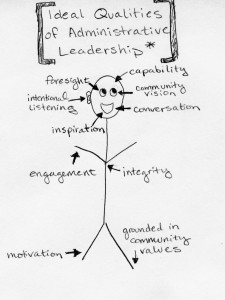This summer we all received the announcement that President Ohle would be resigning at the end of this year’s term, which means this fall the Presidential Search Committee will begin to look for our next president.
It will be an ideal time for the Gustavus community to come together and begin discussing what values and characteristics we would like to see in the next leader of our institution. What should be his or her top priorities in guiding Gustavus to fulfill its mission? What expectations might he or she hold for our community?
I first began thinking about the qualities of administrative leadership in high school, and my thoughts on the subject have continued to evolve throughout my collegiate experience. The Servant Leadership Program here at Gustavus helped me to begin to articulate and nurture these ideas.

What I am looking for in Gustavus’s 17th president is a servant leader. For those of you who might not be familiar with the phrase “servant leader,” let me elaborate.
In The Servant As a Leader, Robert Greenleaf outlines the differences between a person who is a servant first rather than a leader. One is able to identify these differences by asking questions about the leader’s impact on the community.
Greenleaf writes, “Do those served grow as persons? Do they, while being served, become healthier, wiser, freer, more autonomous, more likely themselves to become servants?”
I encourage our community to keep these questions in mind as we consider the future leadership of our institution.
I believe you and I deserve a leader who listens with the intention of giving voice to our concerns and acting on them. A servant leader leads from an understanding of a community that is born through both engaged conversation and intentional listening.
Even though I may be a senior, I am still invested in this presidential search because I believe this community deserves a president who recognizes that the community comes first, someone who will work to preserve, engage, and inspire students, faculty, staff, and alumni as their first priority.
Respecting the traditions that create community from an institution is essential to successful change, yet maintaining open channels of communication as changes are under consideration is of the utmost importance to success as well.
Reflecting on the nature of leadership, cooperation, and vision is necessary for us as a community at this time, so we are able to constructively engage in this process over the upcoming months.
If we want our president to be reflective of our values as a Gustavus community, we need to be at the table and spark the discussion.